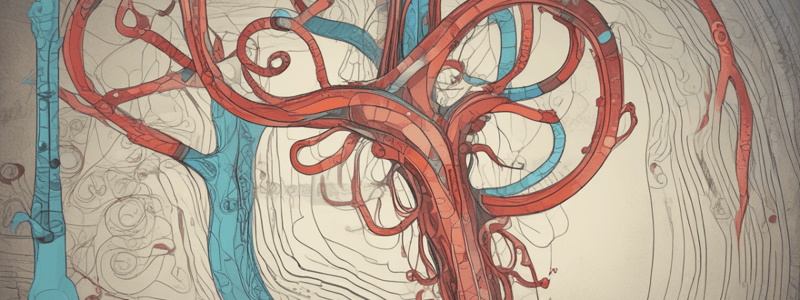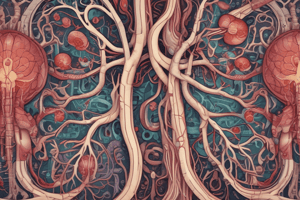Podcast
Questions and Answers
What is the main cause of discoloration of filiform papillae?
What is the main cause of discoloration of filiform papillae?
- Hormonal changes
- Tobacco
- Keratin accumulation
- Bacterial pigments (correct)
What is the treatment for Transient Lingual Papillitis?
What is the treatment for Transient Lingual Papillitis?
- Antibiotics
- Corticosteroids
- Tongue brushing/scraping (correct)
- Surgical excision
What is a characteristic feature of a cyst?
What is a characteristic feature of a cyst?
- A solid mass
- A pathologic cavity lined by epithelium (correct)
- A benign tumor
- A malignant lesion
What is the term for the elongation of filiform papillae due to keratin accumulation?
What is the term for the elongation of filiform papillae due to keratin accumulation?
What is the name of the condition characterized by the formation of a cystic lesion on the tongue?
What is the name of the condition characterized by the formation of a cystic lesion on the tongue?
What is the term for a benign tumor that grows on the surface of the tongue?
What is the term for a benign tumor that grows on the surface of the tongue?
Which oral lesion is characterized by reactive growth, exclusive to gingiva, and a pink/red nodule?
Which oral lesion is characterized by reactive growth, exclusive to gingiva, and a pink/red nodule?
What is the typical treatment for a Peripheral Ossifying Fibroma?
What is the typical treatment for a Peripheral Ossifying Fibroma?
Which oral lesion is commonly seen in the interdental papilla?
Which oral lesion is commonly seen in the interdental papilla?
Which of the following is NOT a characteristic of a Central Giant Cell Granuloma?
Which of the following is NOT a characteristic of a Central Giant Cell Granuloma?
Which oral lesion is more prevalent in females, with a peak incidence in the second decade of life?
Which oral lesion is more prevalent in females, with a peak incidence in the second decade of life?
What is a common characteristic of Odontogenic Cysts?
What is a common characteristic of Odontogenic Cysts?
Which of the following lesions is characterized by a cauliflower-like appearance?
Which of the following lesions is characterized by a cauliflower-like appearance?
Which oral lesion is typically found in the soft tissue, not within the bone?
Which oral lesion is typically found in the soft tissue, not within the bone?
Which lesion typically presents as a red, blue, or purple nodule on the gingiva?
Which lesion typically presents as a red, blue, or purple nodule on the gingiva?
Which of the following is a benign tumor found in the jaw that can be aggressive?
Which of the following is a benign tumor found in the jaw that can be aggressive?
Which lesion is characterized by the presence of a stalk?
Which lesion is characterized by the presence of a stalk?
What is the most common characteristic of pyogenic granuloma?
What is the most common characteristic of pyogenic granuloma?
Which oral lesion is known for presenting significant vascularity and often appears as a red or purple nodule?
Which oral lesion is known for presenting significant vascularity and often appears as a red or purple nodule?
Central giant cell granuloma is primarily associated with which of the following characteristics?
Central giant cell granuloma is primarily associated with which of the following characteristics?
Peripheral ossifying fibroma is most likely to occur in which anatomical structure?
Peripheral ossifying fibroma is most likely to occur in which anatomical structure?
What is a significant feature of oral papilloma?
What is a significant feature of oral papilloma?
Odontogenic cysts are primarily recognized for which characteristic?
Odontogenic cysts are primarily recognized for which characteristic?
Which of the following conditions is most likely to be mistaken for pyogenic granuloma due to its appearance?
Which of the following conditions is most likely to be mistaken for pyogenic granuloma due to its appearance?
What type of tissue change is commonly associated with peripheral ossifying fibroma?
What type of tissue change is commonly associated with peripheral ossifying fibroma?
What is the most common location for a Pyogenic Granuloma?
What is the most common location for a Pyogenic Granuloma?
What is a characteristic feature of a Central Giant Cell Granuloma?
What is a characteristic feature of a Central Giant Cell Granuloma?
Which of the following is TRUE about a Peripheral Ossifying Fibroma?
Which of the following is TRUE about a Peripheral Ossifying Fibroma?
Which of these is NOT a characteristic feature of an Oral Papilloma?
Which of these is NOT a characteristic feature of an Oral Papilloma?
What is the most common type of Odontogenic Cyst?
What is the most common type of Odontogenic Cyst?
What is the primary treatment for a Central Giant Cell Granuloma?
What is the primary treatment for a Central Giant Cell Granuloma?
Which of these lesions is typically associated with poor oral hygiene?
Which of these lesions is typically associated with poor oral hygiene?
What is the primary concern regarding an Odontogenic Keratocyst?
What is the primary concern regarding an Odontogenic Keratocyst?
Flashcards are hidden until you start studying
Study Notes
Reactive Growths in Gingiva
- Occur exclusively in gingival soft tissue.
- Present as pink/red nodules, typically found in interdental papilla.
- More common in females; peak incidence during the second decade of life.
- Treatment involves local excision down to the periosteum and scaling of teeth.
Peripheral Ossifying Fibroma
- Reactive growth that appears as red/blue/purple nodules.
- Can occur across a broad age range and is exclusive to gingiva/ridge.
- Treatment includes local excision down to the bone and scaling of teeth.
Transient Lingual Papillitis
- Characterized by temporary elongation of filiform papillae due to keratin accumulation.
- May discolor as a result of external factors such as tobacco or bacterial pigments.
- Recommended treatment includes tongue brushing and addressing contributing factors.
Cysts
- Defined as pathologic cavities lined by epithelium.
- Common types include lymphoepithelial cysts of the tongue and mucoceles of the lip.
- Mucoceles arise from mucin spillage into soft tissue due to ruptured salivary ducts, often leading to recurrent swelling with periodic rupture.
Reactive Lesions
- Fibromas and lipomas can develop in response to local irritation or trauma, commonly found on the buccal mucosa, labial mucosa, tongue, and gingiva.
- Often associated with denture irritation, leading to lesions on the gingiva.
General Treatment Approach
- Surgical excision is the primary method of treatment for various reactive growths and cysts.
- Addressing local factors like oral hygiene is crucial in treating reactive lesions and maintaining oral health.
Studying That Suits You
Use AI to generate personalized quizzes and flashcards to suit your learning preferences.




